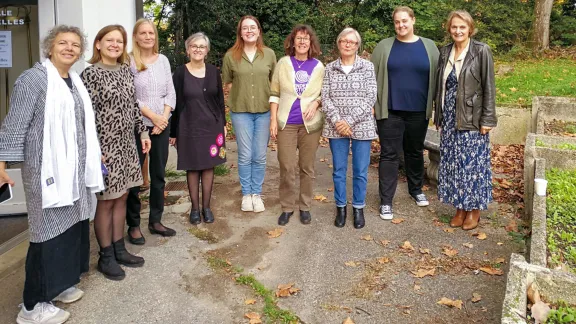
Participants of the meeting of the Women’s Network in Central Western Europe. Photo: Kathrin Wallrabe
New coordinator and priorities for Women’s Network in Central Western Europe
(LWI) – The Women’s Network in Central Western Europe has elected a new regional coordinator for the coming three-year term. Helen Nagelhout (28), from the Protestant Church in the Netherlands, will serve in this position.
“I look forward to working with the women in the network and all the member churches, both in Europe and the other regions,” said Nagelhout. “I strongly believe that when God’s people come together, we can realize a hint of God’s Kingdom here on earth. I am honored to be a part of our common journey towards an equal and just church, and I’m excited to see where our shared faith and commitment will bring us.”
Nagelhout will soon finish her master’s degree in humanistic studies at the University of Humanistic Studies, Utrecht, and has taken up studying theology at the Protestant Theological University. “I wasn’t raised religious, but eventually I found my home in the Lutheran church here in the Netherlands,” she said.
She follows Kathrin Wallrabe from the Evangelical Lutheran Church of Saxony, Germany, who has coordinated the network since 2018.
Strengthening the network
Strengthening the Lutheran World Federation’s (LWF) women’s network in the region and developing a roadmap for the coming years to implement resolutions and priorities of last year’s Pre-Assemblies and the Thirteenth Assembly in Krakow were the main themes on the agenda of the Women’s Network in Central Western Europe meeting.
“To promote the exchange and collaboration among churches, we aim to have a representative of each member church in the region as a member of the network,” said Wallrabe. “Many issues are common to all of us. We can learn from one another how to deal with them, encourage one another and share resources.”
Eight participants from Austria, France, Germany, Italy, the Netherlands, and Switzerland attended the 21-23 October network meeting in Geneva. They also met with Rev. Dr Marcia Blasi, LWF’s Program Executive for Gender Justice and Women’s Empowerment.
Advocating for gender justice, combating gender-based violence
Participants noted a generational change when reflecting on developments in the women’s network and LWF member churches in Central Western Europe. Long-standing network members are retiring, and several church leadership changes have recently occurred or will take place in the coming year. “Because of these changes, the continued joint advocacy for gender justice and strengthening women in leadership remains a priority,” said Wallrabe.

Helen Nagelhout is the new coordinator of the Women’s Network for Central Western Europe. Photo: Helen Nagelhout
The continued joint advocacy for gender justice and strengthening women in leadership remains a priority.
Kathrin Wallrabe, Women’s Network coordinator, Central Western Europe
Another common concern of the network is the development of mechanisms and policies to prevent and combat gender-based violence in member churches and society in general. Churches in the region regard adequate protection against gender-based violence to be a priority, as gender-based violence contradicts the church’s purpose to be a safe space and a place of refuge. Effective prevention, intervention, investigation and support measures are vital. Some churches, including the Union of Protestant Churches of Alsace and Lorraine (UEPAL), have adopted a church policy on this issue, others are still working on it.
Putting Assembly priorities into practice, the Women’s Network for Central Western Europe also aims to strengthen equal opportunities for men and women in the church through constitutional changes, gender-sensitive theology and inclusive language.
Prof. Dr Elisabeth Parmentier, Dean of the Faculty of Practical Theology at the University of Geneva, joined the meeting as a guest speaker. Her input and the subsequent discussion focused on responsible theology as set out in the LWF Strategy 2025–2030: “Theology based on justification by faith resists all attempts to instrumentalize religion for the sake of political interests and all ideologies that create injustice, question the equality of women and men, and lead to exclusionary or escapist communities.”
During a visit to the Communion Office, meeting participants were also welcomed by the LWF’s General Secretary, Rev. Dr Anne Burghardt, the Regional Secretary for Europe, Rev. Dr Ireneusz Lukas, and the Director of the Department for Theology, Mission and Justice, Rev. Dr Sivin Kit. Discussions here focused on the new LWF Strategy 2025–2030 and the relevance of gender justice in the LWF’s engagement locally and globally.


